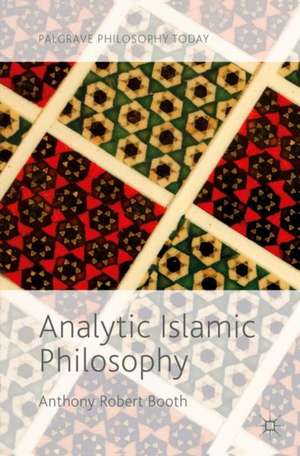Analytic Islamic Philosophy: Palgrave Philosophy Today
Autor Anthony Robert Boothen Limba Engleză Paperback – 9 feb 2018
Preț: 468.25 lei
Preț vechi: 550.88 lei
-15% Nou
Puncte Express: 702
Preț estimativ în valută:
89.60€ • 93.74$ • 74.43£
89.60€ • 93.74$ • 74.43£
Carte tipărită la comandă
Livrare economică 02-16 aprilie
Preluare comenzi: 021 569.72.76
Specificații
ISBN-13: 9781137541567
ISBN-10: 1137541563
Pagini: 256
Ilustrații: XV, 222 p. 3 illus., 2 illus. in color.
Dimensiuni: 155 x 235 x 20 mm
Greutate: 0.34 kg
Ediția:1st ed. 2017
Editura: Palgrave Macmillan UK
Colecția Palgrave Macmillan
Seria Palgrave Philosophy Today
Locul publicării:London, United Kingdom
ISBN-10: 1137541563
Pagini: 256
Ilustrații: XV, 222 p. 3 illus., 2 illus. in color.
Dimensiuni: 155 x 235 x 20 mm
Greutate: 0.34 kg
Ediția:1st ed. 2017
Editura: Palgrave Macmillan UK
Colecția Palgrave Macmillan
Seria Palgrave Philosophy Today
Locul publicării:London, United Kingdom
Cuprins
Introduction 1. Islam and Philosophy 2. The Greek Legacy 3. Al Kindi and the Rise of the Falasifa 4. Al Farabi and Islamic Neo-Platonism 5. Avicenna and the Flying Man Argument 6. Al Ghazali's Attack on the Falasifa 7. The Philosophers Strike Back: Averroes 8. Sufism 9. The Illuminationist School to Contemporary Islamic Philosophy 10. Islam, Philosophy and Politics Conclusion
Notă biografică
Anthony Robert Booth is Senior Lecturer and Head of the Department of Philosophy at the University of Sussex, UK. He has worked mainly on the Ethics of Belief in both the Western and Islamic traditions. He has published articles appearing in such journals as Journal of Philosophy, European Journal of Philosophy, Philosophy and Phenomenological Research, and Synthese. He also recently published Islamic Philosophy and the Ethics of Belief (2016) and co-edited Intuitions (2014).
Textul de pe ultima copertă
This book is an introduction to Islamic Philosophy, beginning with its Medieval inception, right through to its more contemporary incarnations. Using the language and conceptual apparatus of contemporary Anglo-American ‘Analytic’ philosophy, this book represents a novel and creative attempt to rejuvenate Islamic Philosophy for a modern audience. It adopts a ‘rational reconstructive’ approach to the history of philosophy by affording maximum hermeneutical priority to the strongest possible interpretation of a philosopher’s arguments while also paying attention to the historical context in which they worked. The central canonical figures of Medieval Islamic Philosophy – al-Kindi, al-Farabi, Avicenna, al-Ghazali, Averroes – are presented chronologically along with an introduction to the central themes of Islamic theology and the Greek philosophical tradition they inherited. The book then briefly introduces what the author collectively refers to as the ‘Pre-Modern’ figures including Suhrawardi, Mulla Sadra, and Ibn Taymiyyah, and presents all of these thinkers, along with their Medieval predecessors, as forerunners to the more modern incarnation of Islamic Philosophy: Political Islam.
Caracteristici
Fills a gap in the field by presenting research on analytic Islamic philosophy in a newly accessible textbook format Makes significant connections between historic Islamic texts and philosophy and contemporary debates within analytic philosophy Takes a pedagogically oriented approach to the topic, including chapter objectives, summaries, and essay questions to encourage further reading around the subject















